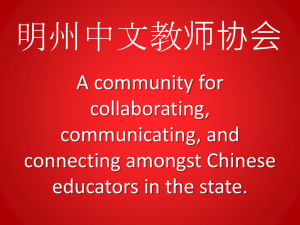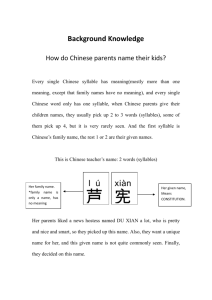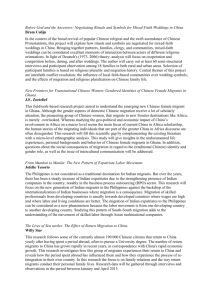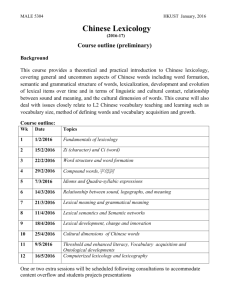Call for Paper
advertisement
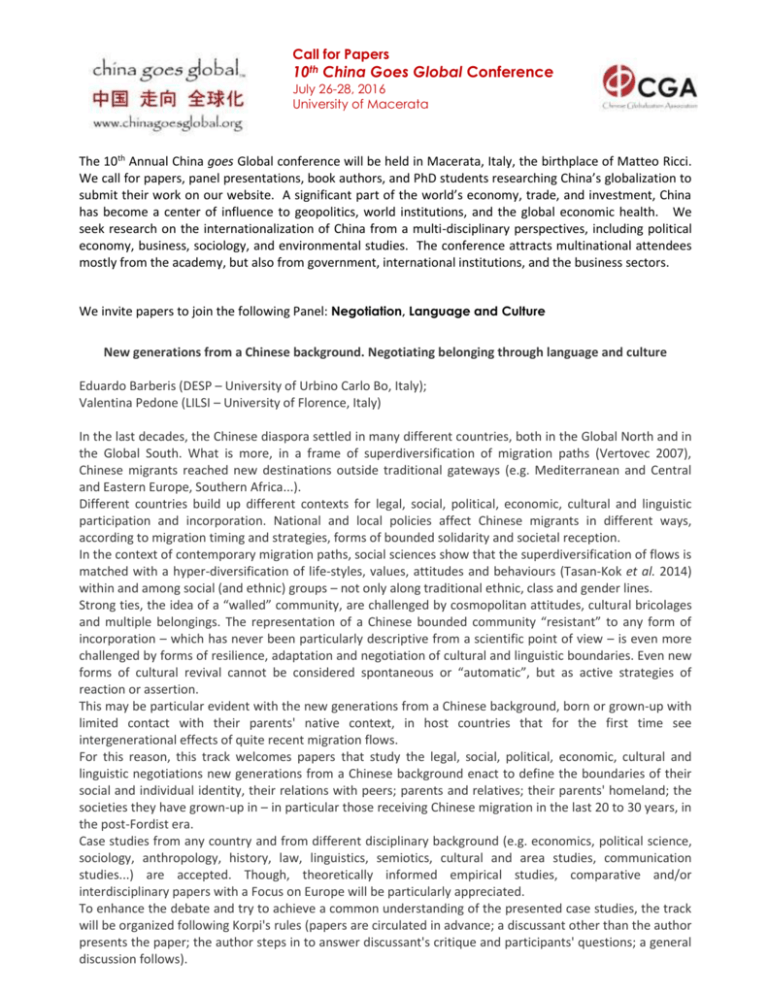
Call for Papers 10th China Goes Global Conference July 26-28, 2016 University of Macerata The 10th Annual China goes Global conference will be held in Macerata, Italy, the birthplace of Matteo Ricci. We call for papers, panel presentations, book authors, and PhD students researching China’s globalization to submit their work on our website. A significant part of the world’s economy, trade, and investment, China has become a center of influence to geopolitics, world institutions, and the global economic health. We seek research on the internationalization of China from a multi-disciplinary perspectives, including political economy, business, sociology, and environmental studies. The conference attracts multinational attendees mostly from the academy, but also from government, international institutions, and the business sectors. We invite papers to join the following Panel: Negotiation, Language and Culture New generations from a Chinese background. Negotiating belonging through language and culture Eduardo Barberis (DESP – University of Urbino Carlo Bo, Italy); Valentina Pedone (LILSI – University of Florence, Italy) In the last decades, the Chinese diaspora settled in many different countries, both in the Global North and in the Global South. What is more, in a frame of superdiversification of migration paths (Vertovec 2007), Chinese migrants reached new destinations outside traditional gateways (e.g. Mediterranean and Central and Eastern Europe, Southern Africa...). Different countries build up different contexts for legal, social, political, economic, cultural and linguistic participation and incorporation. National and local policies affect Chinese migrants in different ways, according to migration timing and strategies, forms of bounded solidarity and societal reception. In the context of contemporary migration paths, social sciences show that the superdiversification of flows is matched with a hyper-diversification of life-styles, values, attitudes and behaviours (Tasan-Kok et al. 2014) within and among social (and ethnic) groups – not only along traditional ethnic, class and gender lines. Strong ties, the idea of a “walled” community, are challenged by cosmopolitan attitudes, cultural bricolages and multiple belongings. The representation of a Chinese bounded community “resistant” to any form of incorporation – which has never been particularly descriptive from a scientific point of view – is even more challenged by forms of resilience, adaptation and negotiation of cultural and linguistic boundaries. Even new forms of cultural revival cannot be considered spontaneous or “automatic”, but as active strategies of reaction or assertion. This may be particular evident with the new generations from a Chinese background, born or grown-up with limited contact with their parents' native context, in host countries that for the first time see intergenerational effects of quite recent migration flows. For this reason, this track welcomes papers that study the legal, social, political, economic, cultural and linguistic negotiations new generations from a Chinese background enact to define the boundaries of their social and individual identity, their relations with peers; parents and relatives; their parents' homeland; the societies they have grown-up in – in particular those receiving Chinese migration in the last 20 to 30 years, in the post-Fordist era. Case studies from any country and from different disciplinary background (e.g. economics, political science, sociology, anthropology, history, law, linguistics, semiotics, cultural and area studies, communication studies...) are accepted. Though, theoretically informed empirical studies, comparative and/or interdisciplinary papers with a Focus on Europe will be particularly appreciated. To enhance the debate and try to achieve a common understanding of the presented case studies, the track will be organized following Korpi's rules (papers are circulated in advance; a discussant other than the author presents the paper; the author steps in to answer discussant's critique and participants' questions; a general discussion follows). Please submit your paper through our online submission system no later than March 15, 2016. Papers should follow the author style and referencing guide provided on the conference website. By submitting a paper, all authors also agree to review up to 3 papers, and at least one author agrees to attend the conference. Submissions must be done online: http://www.chinagoesglobal.org/conference/paper-submission/ Important Dates Deadline for submission: March 15, 2016 Paper acceptance/rejection: May 1, 2016 Revised paper submission: June 1, 2016




